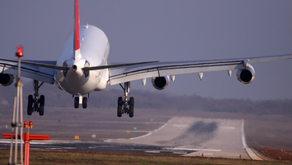Aircraft Owner Trusts | Frequently Asked Questions
Bank of Utah offers many financial services, including Corporate Trust services. We have spent years building our expertise in this area, specifically with trusts involving aircraft and equipment. We’ve created a list of Frequently Asked Questions below to provide you with clear, current information about these complex legal structures.
What is an Aircraft Owner Trust, and How Do They Work?
Aircraft owner trusts are a highly regulated method of registering aircraft in the U.S. on the Federal Aviation Administration (FAA) registry. Aircraft owner trusts are commonly used and have been recognized by the FAA for more than 50 years.
Under a trust relationship, an aircraft owner (known as the trustor or beneficiary) transfers title of the aircraft to a trust. As title to the aircraft is held by the trustee, the aircraft is then registered in the name of the trustee, for the benefit of the trustor. For example, when a customer enters into an aircraft trust agreement with Bank of Utah, the Bank becomes the trustee and the aircraft is registered in the Bank’s name.
Bank of Utah does not do business with sanctioned entities.
What Role Do Aircraft Owner Trusts Play in the Aviation Industry?
Aircraft trusts comply with the FAA’s registration requirements and are used by businesses and individuals. Bank of Utah’s owner trust services are used for many reasons, including for entities and individuals that do not qualify as U.S. citizens under the FAA’s intricate citizenship rules.
To explain, U.S. law restricts ownership of aircraft to U.S. citizens. The defined term of U.S. citizen for FAA purposes is unique. For an individual, U.S. citizenship requirements are straightforward, but for a business (a partnership or company) the FAA’s definition of U.S. citizenship has specific requirements. Many U.S. companies do not qualify as citizens because, for FAA registration purposes, U.S. citizenship for companies is defined by the percentage of ownership that can be verified as being U.S. citizen owned OR who controls the company. Without aircraft owner trusts, even American-based companies may not be able to register their aircraft for reasons as simple as the company president is not a U.S. citizen.
Trusts are also important to the aviation industry because they are used to facilitate many other functions in aviation, including:
- To permit the sale of aircraft to foreign leasing companies or businesses. Trusts promote foreign capital investment into aircraft built in the U.S. and registered with the FAA, which promotes investment and jobs in the U.S. market.
- To grant U.S. airlines greater access to aircraft. Nearly 50 percent of all commercial aircraft in the U.S. are leased, and much of the financing comes from outside the U.S. Because of this, the use of owner trusts has grown more important to U.S. airlines, allowing them greater, and less expensive, access to aircraft for their fleets.
- To enable sales of the equity ownership in the aircraft. Aircraft leasing companies extensively use trusts to facilitate their business. If an aircraft is in a trust, while on lease to an airline, the leasing company can sell their equity position to another leasing company and the aircraft does not need to be grounded while ownership transfers. Instead, with the ownership registered through a trust, aircraft operations can continue during the transfer without disruption of flights.
- To secure interest in an asset. Trusts are often required by lenders to help perfect their security interest (secure interest in an asset that cannot be claimed by any other party).
- To preserve value in the aircraft. The FAA registry is considered the “Gold Standard” of aviation registration based on the administration’s strict maintenance requirements and oversight. Commercial, business, and other owners of aircraft seek to use the FAA registry to preserve value in the aircraft, as its maintenance standard is well known and reliable.
Are Aircraft Owner Trusts Legal, in Regard to Meeting the FAA's Citizenship Definition?
Yes, U.S. law does allow for owner trusts to be set up when an individual or company does not meet the FAA’s citizenship definition. The FAA recognizes the trustee of the trust as the titled and registered owner of the aircraft. Because the trust is filed with the FAA, the U.S. government has a record of the trust, the trustee and the trustor. Aircraft owner trusts established with a trustor that doesn’t qualify as a U.S. citizen under the FAA rules are highly regulated and require specific provisions to ensure America’s interests come first.
How is Bank of Utah Involved with Aircraft Owner Trusts?
Bank of Utah’s well-respected Corporate Trust department has built a special expertise and reputation in aircraft trusts.
As an aircraft owner trustee, Bank of Utah enters into an aircraft lease agreement turning operational control of the aircraft over to the lessee who operates the aircraft, much like a car is leased. As such, Bank of Utah does not have operational control of the aircraft, even though Bank of Utah, as trustee, is listed in public records as the registered owner. The Bank transfers control to an operator or lessee through a written agreement. In fact, many of the aircraft operated by commercial airlines are owned through owner trusts and subsequently leased to the airline.
What is the Advantage of Having a Bank as a Trustee?
Banks operate within a highly regulated industry and work with U.S. government agencies to ensure the legality of trust agreements and that all U.S. laws and regulations — banking and FAA-related — are adhered to at all times. This is much more beneficial than having a private entity as a trustee because non-financial institutions aren’t engrained in this strict system of compliance.
How Does Bank of Utah Ensure that All Aircraft Owner Laws and Processes are Followed?
Bank of Utah works diligently to follow FAA regulations and banking regulations. We continually update our internal risk management processes to implement best practices and enhance the risk assessment of countries as the world changes.
Bank of Utah does not do business with sanctioned entities. The Office of Foreign Assets Control (OFAC) — part of the U.S. Department of the Treasury — publishes lists of individuals and companies owned by, or acting for or on behalf of, sanctioned countries. If an entity becomes sanctioned, Bank of Utah works with the U.S. government to freeze the account, then follows the government’s direction regarding further actions.
Additionally, all owners of an aircraft are required to follow FAA rules and regulations, including maintenance regulations. If the FAA finds an issue related to an aircraft, Bank of Utah works alongside the government and our customer to resolve the matter and take appropriate action. That action could include terminating the aircraft owner trust agreement and relationship if the situation warrants.
Can Bank of Utah Share the Identity of the Trustor, or Customer?
The trust relationship, like most financial service relationships, is confidential. This is governed by U.S. banking laws. Because the trust is filed with the FAA, the U.S. government has a record of the trust, the trustee and the owner of the aircraft. However, Bank of Utah is both contractually and legally prohibited from sharing ownership information with anyone other than the FAA, unless the requesting party is a government regulator or if the request is pursuant to a legal subpoena.
Therefore, Bank of Utah is not able to discuss ownership information or actions taken within our customer portfolio, even though some of this information is a matter of public record. This is consistent with both FAA and banking regulations.
More About Aircraft Trusts
Bank of Utah is committed to the corporate trust business for the long term. Our organization has some of the finest, most experienced trust professionals in the industry, and we provide the highest quality corporate trust services.
Media Inquiries
For press and media requests, contact: Cherie Hanson, senior vice president of Marketing and Communications.
Glossary of Terms
Trust
: A legal arrangement that allows a person or an entity to set up their assets to be held by a third party. An aircraft owner trust, for example, is an agreement that allows an aircraft owner to appoint a third party to hold the title of their aircraft.Trustor or Beneficiary
: The person or entity that establishes a trust. A trustor may also be called a beneficiary. In an aircraft owner trust, the trustor or beneficiary is the owner of the aircraft.Trustee
: The person or entity designated in the trust arrangement to hold the property in the trust. When a customer sets up an aircraft owner trust with Bank of Utah, Bank of Utah becomes the trustee, meaning the Bank holds the title of the aircraft and that the aircraft is registered in the Bank’s name.






